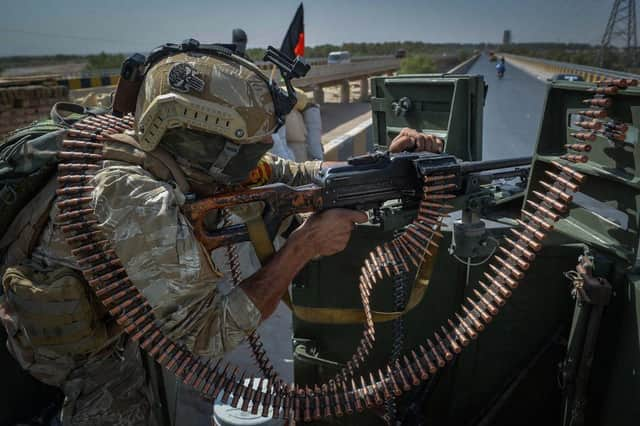Who are the Taliban? The Islamist group explained - and what the Afghanistan President has said about attacks


Intense fighting has led to residents of Lashkar Gah being urged to leave their homes, as key cities in Afghanistan are under threat of being overtaken by the Taliban.
President Ashraf Ghani said that the current situation is due to the “hasty” decision for the United States to pull its troops.
This is what you need to know.
Who are the Taliban?
Advertisement
Hide AdAdvertisement
Hide AdThe Taliban is an extremely conservative political and religious faction. The Taliban, which means “students” or “seekers” in Pashto, first emerged in the early 1990s in northern Pakistan, following the withdrawal of Soviet troops from Afghanistan.
The Council on Foreign Relations (CFR) explains: “The Taliban is a predominantly Pashtun, Islamic fundamentalist group that ruled Afghanistan from 1996 until 2001, when a U.S.-led invasion toppled the regime for providing refuge to al-Qaeda and Osama bin Laden.
“The Taliban regrouped across the border in Pakistan and has led an insurgency against the U.S.-backed government in Kabul for more than nineteen years.”
The CFR explains that the group was formed by “Islamic guerilla fighters” and were “joined by younger Pashtun tribesmen who studied in Pakistani madrassas, or seminaries”.
Advertisement
Hide AdAdvertisement
Hide AdThe Taliban promised to restore peace and security in Pashtun areas between Pakistan and Afghanistan, and to enforce their own version of Islamic law once in power.
“The Taliban imposed a harsh brand of justice as it consolidated territorial control,” the CFR says.
In 2020, the Taliban signed a peace agreement with the US, and entered into power-sharing negotiations with the Afghan government - however, the group has continued to launch attacks.
The CFR describes the Taliban as “a powerful fighting force that threatens Afghan democratic institutions, citizens’ rights, and regional security” and that the group has managed to withstand counter insurgency operations from the world’s “most powerful security alliance” NATO.
What has happened recently in Afghanistan?
Advertisement
Hide AdAdvertisement
Hide AdKey cities in the country are under threat of being overrun by the Taliban as US, UK and NATO forces complete their withdrawal from the country.
The Taliban has since rapidly advanced and violence increased. The group has targeted at least three provincial capitals overnight - Lashkar Gah, Kandahar and Herat. This follows a weekend of heavy fighting that has seen thousands of civilians fleeing the militants.
In Lashkar Gah, Helmand’s provincial capital, the Taliban launched attacks on the city centre and its prison after the Government announced the deployment of commandos to the area.
Residents of Lashkar Gah have been urged to evacuate the city ahead of an army operation against the Taliban.
Advertisement
Hide AdAdvertisement
Hide AdGeneral Sami Sadat called on people to leave as soon as possible. According to the UN, at least 40 civilians have been killed in Lashkar Gah in the past day amid fighting.
What did the Afghan President say?
Speaking to the Afghanistan parliament, President Ashraf Ghani said: “The situation which we are facing is due to the sudden decision [to withdraw].
“I told the American president that I respect your decision, because it was his decision, but I knew that this decision will have some consequences and the crisis management will be put on Afghans.
“This [peace] process created doubt and ambiguity and its result is the situation which we and you see.
Advertisement
Hide AdAdvertisement
Hide Ad“I want to repeat here that our priority in republic lines is a lasting or just peace, but unfortunately I see the Taliban and their supporters intend sedition.”
The President continued: “We either sit knee to knee at the real negotiating table or break their [Taliban] knees on the battleground.”
Hours after Ghani’s comments, Taliban fighters gained control of the provincial government’s radio and TV building, and replaced regular broadcasts with religious songs.